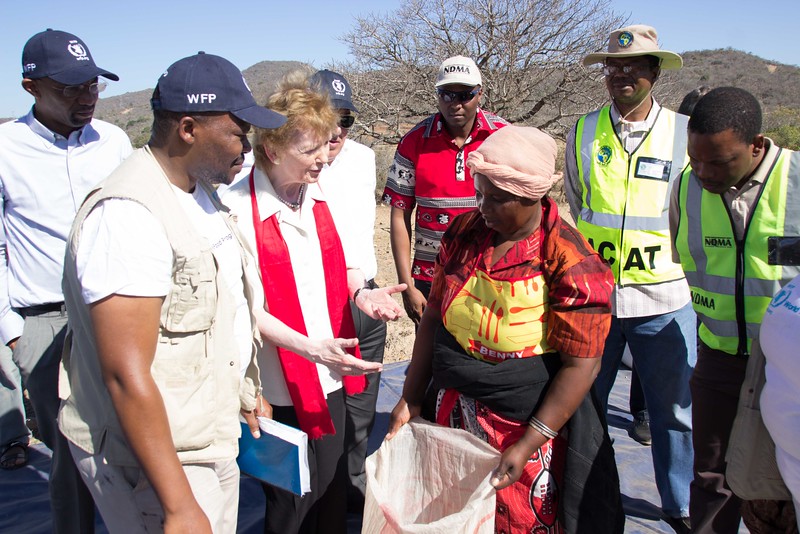Mary Robinson traveled to Swaziland between 29-31 August in her capacity as the Secretary-General’s Special Envoy on El Niño and Climate meeting Heads of State and Government, as a guest of the 36th Ordinary Summit of the Southern African Development Community (SADC). She met with El Niño affected communities, development and humanitarian groups, local government officials, UN agencies and SADC heads of State sharing lessons learned at all levels of humanitarian response.
Mary Robinson also met with His Majesty King Mswati III of Swaziland, who has been elected to chair SADC. She noted the terrible impacts of the drought caused by El Niño and exacerbated by climate change; and her wish to engage Southern African leaders in the promotion of a ‘blueprint for change’ which she is drafting with her fellow Special Envoy on El Niño and Climate, Ambassador Macharia Kamau, which is aimed at a more integrated approach to investments in resilience so that future episodes need not become disasters.
During a trip to the drought affected region of Dvokdvweni Mary Robinson met with Mrs. Gwebu and Mrs Thwala elderly members of the community who explained how the drought had killed their livestock and made water completely unavailable in their households. When asked what they feared most in the future the women responded ‘everything’. The drought has caused them to fear for their families, their livelihoods, the future of their communities and the prospects of their children and grandchildren.
However, Mary Robinson was also struck by a countervailing sense of hope, young leaders, such as Mhlengi, Simo and Minehle are organising themselves and acting to improve their lives; distributing ‘dignity kits’ to their peers and ensuring that they can make informed choices on sexual health as well as protecting themselves from disease and insecurity.
Although the effects of El Niño have concluded, food insecurity is not expected to peak until 2017, leaving a lasting economic, social and human legacy. Up to 579,000 children in Southern Africa, whose contribution to climate change has been negligible, are facing the most severe form of malnutrition, and a consequent very real risk of death. This fact demonstrates that this is not just an issue of climate resilience but also one of justice.
Mary Robinson identified the need for funding to ensure that the most vulnerable members of these communities do not pay the price for climate change exacerbated drought. She committed with her fellow Special Envoy on El Niño and Climate, Ambassador Macharia Kamau, to addressing the funding gap and commended the collaborative approach of SADC, which has launched a joint appeal.
However, she also stressed that following traditional models of humanitarian response will not be viable. In many ways the 2015/16 El Niño is a window into a climate future that will be less predictable and more extreme. The international community needs to recognise that the next humanitarian disaster will likely be upon us even before communities have recovered from this one.
Mary Robinson stressed that when a humanitarian response to a predictable weather event like El Niño is required, it means that our resilience and preparedness efforts have not succeeded. The focus needs to not just be on humanitarian response but also risk-informed development that prioritised prevention, mitigation and preparedness. This leads to outcomes that are more just, put people in the centre of the solution and deliver greater justice in the face of climate effects.
Related Links


